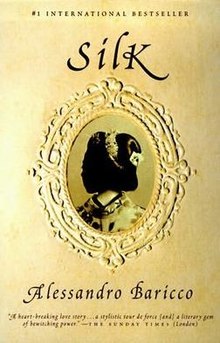This review went too deep into the book and might contain spoilers. If you plan to read the book, I’d recommend you to go right ahead and skip the plot.
Plot:
A would-be soldier, Herve Joncour’s life takes a U-turn when he meets Baldabiou. He becomes a silkworm trader in Lavilledieu, France. He takes long trips to countries like Syria and Egypt to buy silkworm eggs and trades them with the local merchants in Lavilledieu.
A would-be soldier, Herve Joncour’s life takes a U-turn when he meets Baldabiou. He becomes a silkworm trader in Lavilledieu, France. He takes long trips to countries like Syria and Egypt to buy silkworm eggs and trades them with the local merchants in Lavilledieu.
Why not buy it in the Mediterranean?, you may ask. The reason being a wide spread epidemic in the country.
Herve would travel and return in time for the High Mass and rest for the later part of the year with his wife Helene.
Once the epidemic starts to spread far and wide, they do not know where to procure eggs. This is when Baldabiou asks Herve Joncour to travel to Japan, at the end of the world, cut off to foreigners. After pooling money from all the local silk merchants in Lavilledieu, Herve starts off his long and tedious journey to Japan. Once in the Chinese borders, he embarks a smuggler’s ship to reach Shirakawa in Japan. Hara Kei, the local head of the village, hosts him and trades silkworm eggs for gold chips. The first time Herve meets Hara Kei, he sees a women draped in orange with oriental eyes whose face is of a young girl. He develops desire for her during every travel henceforth.
He would receive a note from her, but in Japanese. To seek help in reading the letter, he visits a prostitution place headed by Madame Blanche, a Japanese women who wears blue flowers in her fingers like rings. She reads the note and asks him to stay away from the girl.
On his 4th visit to Japan, the war had broken out. The village of Hara Kei had been burnt down. Yet, he desires to see the girl. He travels for days with a young lad to find the village troops who are on the move. When he finds them, Hara Kei becomes aware of Herve’s intentions and asks him to stay away from his klan. A dejected Herve battles his thought between the girl and his profession. He then leaves the tribe and bribes a Japanese official for silk worms. This time he decides to take a different route as he is already late and the climate for the eggs is not right. That year, by the time he returns to Lavilledieu , all his eggs are dead.
His wife Helene notices the changes in him but never speaks out or questions him. One day, he receives a letter, of monograms, written in Japanese. He again visits Madame Blanche, who again reads the letter for him which turns out to be a love letter. After she completes the letter he leaves the place, never to return.
Herve Joncour, leads his life as before. He takes vacations with his wife every year and builds the garden that he always wanted to. Life is normal until Helen dies of an undiagnosable disease. One day when he visits her cemetery, he finds a garland made of blue flowers. Herve makes up his mind to visit Madame Blanche who has now moved to Paris as a mistress. Herve asks her if Helene had asked Madame Blanche to write the letter. In turn Madame Blanche says that the letter was indeed written by Helen, and she just translated it. Madame Blanche says that Helen had such a sweet voice and almost earned to be the girl who was in the letter.
Herve Joncour bides goodbye to the Madame and lives the rest of his life making peace with his lost love.
What I liked about the book?
Every time Herve Joncour travelled to Japan, the route was the same. However, the author one prominent difference in the description where Herve crosses the lake Baikal.
Lake Baikal, known locally as “the sea”.
Silk by Alessandro Baricco, Translated by Guido Waldman
Lake Baikal, known locally as “the deamon”.
Silk by Alessandro Baricco, Translated by Guido Waldman
Lake Baikal, known locally as “the last”.
Silk by Alessandro Baricco, Translated by Guido Waldman
Lake Baikal, known locally as “the holy”.
Silk by Alessandro Baricco, Translated by Guido Waldman
Lake Baikal, considered the deepest lake in the world, currently located in Russia, provokes my interests thus!
Favorite quote:
“They will return. It’s always hard to resist the temptation to return, isn’t it?”
Silk by Alessandro Baricco, Translated by Guido Waldman
The novel is really short. I have no idea why my review went so long. But thinking of it, the author had a really good plot that he could have dragged to a considerably long book. Yet, he chose to keep it short and sweet. Totally worth the read!

Interesting review which draws attention to the book.
Thank you! It is an interesting book indeed 🙂